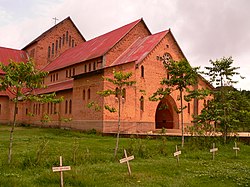Christianity in the Democratic Republic of the Congo: Difference between revisions
| Line 15: | Line 15: | ||
===Roman Catholicism=== |
===Roman Catholicism=== |
||
{{main|Roman Catholicism in the Democratic Republic of the Congo}} |
{{main|Roman Catholicism in the Democratic Republic of the Congo}} |
||
For much of the colonial period, Catholic missions received preferential treatment and a subsidy from the state denied to missions from other denominations. |
|||
===Protestantism=== |
===Protestantism=== |
||
{{main|Church of Christ in Congo}} |
{{main|Church of Christ in Congo}} |
||
Revision as of 21:08, 16 October 2016


| Christianity by country |
|---|
 |
|
|
Christianity is the majority religion of the Democratic Republic of the Congo and is professed by about 92.2 percent of the population. The largest denomination is Roman Catholicism which represents 50 percent, and is followed by Protestantism and Kimbanguism (39 percent), Orthodox (0.1 percent) and other Christian (7 percent).[1] The history of Christianity in the area of the modern-day Congo is closely linked to the history of European colonial expansion.
History
The earliest evidence for the adoption of Christian religious pratices in the modern-day Democratic Republic of the Congo dates to the late 15th century. In 1491, King Nzinga of the Kongo Kingdom[a] converted to Roman Catholicism, taking the Christian name João, after coming into contact with Portuguese colonial explorers. The conversion facilitated trade with the Portuguese and increased the status of the Kongo Kingdom in the eyes of European states. Afonso I (r. 1506–43) even travelled to Europe where he studied religion. The Kongo Kingdom adopted a form of Catholicism and was recognised by the Papacy, preserving the beliefs for nearly 200 years.[2]
The largest expansion of Christianity occurred under Belgian colonial rule. In 1885, Belgium's monarch, Leopold II, established a personal colony in Central Africa known as the Congo Free State which, in 1908, was annexed by Belgium as the Belgian Congo. Under both the Free State and Belgian regimes, Christian missions were encouraged to work in the Congo as part of the civilising mission which served as the colonial project's justification to European public opinion.
Since 2014, sporadic outbreaks of violence against Christians have occurred in North Kivu as part of the ongoing Kivu conflict. Massacres of approximately 645 people have been perpetrated by the Islamist Allied Democratic Forces rebel group which has been largely forced out of neighbouring Uganda.[3]
By denomination
Roman Catholicism
For much of the colonial period, Catholic missions received preferential treatment and a subsidy from the state denied to missions from other denominations.
Protestantism
The first Protestant mission (sent by the British Baptist Missionary Society) arrived in the Congo in 1878 shortly before the creation of the Congo Free State.[4] Throughout the colonial period, the Protestants had a difficult relationship with the colonial authorities. Most Belgian colonial officials were Catholic and distrusted Protestant missions, which were often from the United Kingdom or the United States, but were unable to expel them under the terms of the Berlin Conference.[5]
Others
See also
References
- ^ The Kongo Kingdom was located on the Atlantic coast of Central Africa in parts of modern-day Democratic Republic of the Congo, Republic of the Congo, and Angola.
Citations
- ^ Joshua Project - Congo, Democratic Republic of - Religions
- ^ Ross, Emma George. "African Christianity in Kongo". Heilbrunn Timeline of Art History (Metropolitan Museum of Art). Retrieved 16 October 2016.
- ^ "Villages 'obliterated' as Christian persecution grows in eastern Congo". The Catholic Herald. 19 Aug 2016. Retrieved 16 October 2016.
- ^ Markowitz 1970, p. 234.
- ^ Markowitz 1970, pp. 234–6.
Further reading
- Markowitz, Marvin D. (1973). Cross and Sword: the political role of Christian missions in the Belgian Congo, 1908-1960. Stanford: Hoover Institution Press. ISBN 9780817911416.
